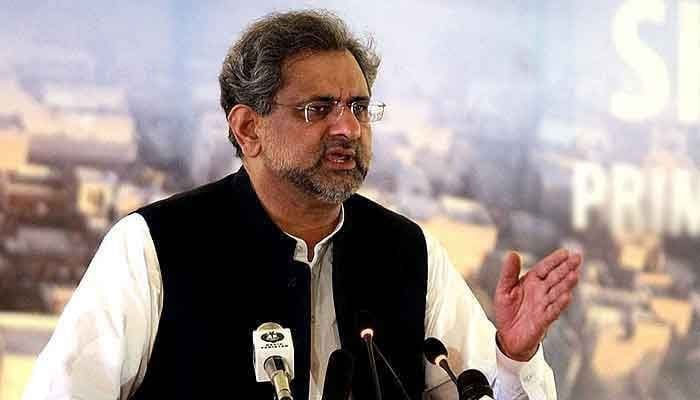Abbasi terms democracy, political stability solution to all crises
“Without a united opposition, an effective political movement is not possible,” says APP chief
DERA ISMAIL KHAN: Awam Pakistan Party (APP) Chairman and former prime minister Shahid Khaqan Abbasi said on Friday that the country was currently facing economic, political, and security crises, and the only solution lies in the democratic process and political stability.
“Opposition is not part of any protest movement at the moment. Our priority is to unite all opposition parties on a single platform, as both the government and opposition have remained divided over the past year. Without a united opposition, an effective political movement is not possible,” said APP chief while speaking to the media here.
When asked about the recent decrease in electricity prices, he said the reduction was not due to any government performance but because of a decline in global petroleum prices. He warned that if oil prices rise again, electricity rates would also go up. He urged the government to provide a long-term and sustainable solution to the energy crisis.
Regarding the situation in Balochistan, he said the crisis there was not just a local issue but a cause for national concern. He stressed that political instability and division arise where elections were not transparent. “The legitimate demands of the Baloch people must be acknowledged, including control over resources, dignity, and political representation - demands shared by people across the country,” explained the former prime minister.
Speaking about the All Parties Conference (APC), Abbasi said that such conferences were meaningless if key political figures like Pakistan Tehreek-e-Insaf founder Imran Khan were not included.
He said the government should have taken the initiative to bring Imran Khan on parole to attend the APC, which was not an impossible task. Abbasi also urged Imran Khan to show magnanimity and allow his party to participate in national discussions. He lamented that mutual discord is currently the biggest obstacle to collective decision-making in the country.
When questioned, he said the direct dialogue with the Afghan government was not within the jurisdiction of the Khyber Pakhtunkhwa government; this issue should be handled by the federal government.
“The international relations are always decided at the state level and that any direct involvement by a provincial government could complicate the issue rather than resolve it,” Abbasi mentioned that consultations are ongoing with different parties to overcome differences and develop a collective political approach.
-
 Why Prince William Releases Statement On Epstein Scandal Amid Most 'challenging' Diplomatic Trip?
Why Prince William Releases Statement On Epstein Scandal Amid Most 'challenging' Diplomatic Trip? -
 Historic Mental Health Facility Closes Its Doors
Historic Mental Health Facility Closes Its Doors -
 Top 5 Easy Hair Fall Remedies For The Winter
Top 5 Easy Hair Fall Remedies For The Winter -
 Japan Elections: Stock Surges Record High As PM Sanae Takaichi Secures Historic Victory
Japan Elections: Stock Surges Record High As PM Sanae Takaichi Secures Historic Victory -
 Prince William, Kate Middleton Finally Address Epstein Scandal For First Time: 'Deeply Concerned'
Prince William, Kate Middleton Finally Address Epstein Scandal For First Time: 'Deeply Concerned' -
 Kim Kardashian Promised THIS To Lewis Hamilton At The 2026 Super Bowl?
Kim Kardashian Promised THIS To Lewis Hamilton At The 2026 Super Bowl? -
 Andrew Mountbatten-Windsor Throws King Charles A Diplomatic Crisis
Andrew Mountbatten-Windsor Throws King Charles A Diplomatic Crisis -
 Barack Obama Hails Seahawks Super Bowl Win, Calls Defense ‘special’
Barack Obama Hails Seahawks Super Bowl Win, Calls Defense ‘special’ -
 Pregnant Women With Depression Likely To Have Kids With Autism
Pregnant Women With Depression Likely To Have Kids With Autism -
 $44B Sent By Mistake: South Korea Demands Tougher Crypto Regulations
$44B Sent By Mistake: South Korea Demands Tougher Crypto Regulations -
 Lady Gaga Makes Surprising Cameo During Bad Bunny's Super Bowl Performance
Lady Gaga Makes Surprising Cameo During Bad Bunny's Super Bowl Performance -
 Paul Brothers Clash Over Bad Bunny's Super Bowl Performance
Paul Brothers Clash Over Bad Bunny's Super Bowl Performance -
 South Korea: Two Killed As Military Helicopter Crashes During Training
South Korea: Two Killed As Military Helicopter Crashes During Training -
 Elon Musk Unveils SpaceX’s Moon-first Strategy With ‘self Growing Lunar City’
Elon Musk Unveils SpaceX’s Moon-first Strategy With ‘self Growing Lunar City’ -
 Donald Trump Slams Bad Bunny's Super Bowl Performance: 'Absolutely Terrible'
Donald Trump Slams Bad Bunny's Super Bowl Performance: 'Absolutely Terrible' -
 Jake Paul Criticizes Bad Bunny's Super Bowl LX Halftime Show: 'Fake American'
Jake Paul Criticizes Bad Bunny's Super Bowl LX Halftime Show: 'Fake American'




